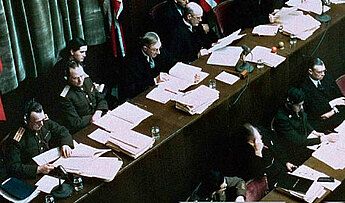Datenbanken

Akzeptanz Online Plattform
Die Online-Plattform ist eine Sammlung von Bildungs- und Forschungsinstrumenten, die öffentlich zugänglich sind und sich an ein breites Publikum aus Akademiker:innen und Praktiker:innen richten, die daran interessiert sind, die Akzeptanz des internationalen Strafrechts auf regionaler, nationaler oder internationaler Ebene zu verstehen.
![[Translate to Deutsch:] [Translate to Deutsch:]](/fileadmin/_processed_/d/0/csm_Research_-_Resources_-_Teaser_ICL_in_Germany_4909d4d3dd.jpg)
Völkerstrafrecht in Deutschland
Die digitale Datenbank „Internationales Völkerstrafrecht in Deutschland“ ermöglicht eine systematische Suche nach allen Entscheidungen deutscher Gerichte mit Bezug zum internationalen Strafrecht.
Andere Ressourcen

Dokumentarfilm - Frieden durch Recht
In Würdigung des Lebens und der Arbeit von Thomas Buergenthal, hat die Akademie den Dokumentarfilm „Frieden durch Gerechtigkeit - Das Vermächtnis von Thomas Buergenthal“ produziert.

Quellenverzeichnis zu den Nürnberger Prinzipien
Diese Ressourcensammlung zu den Nürnberger Prinzipien bietet einen Überblick über offizielle Dokumente, Rechtsprechung und wissenschaftliche Literatur.

![[Translate to Deutsch:] [Translate to Deutsch:]](/fileadmin/_processed_/3/7/csm_Research_-_Resources_-Teaser_Lexsitus_fca4751e1e.jpg)